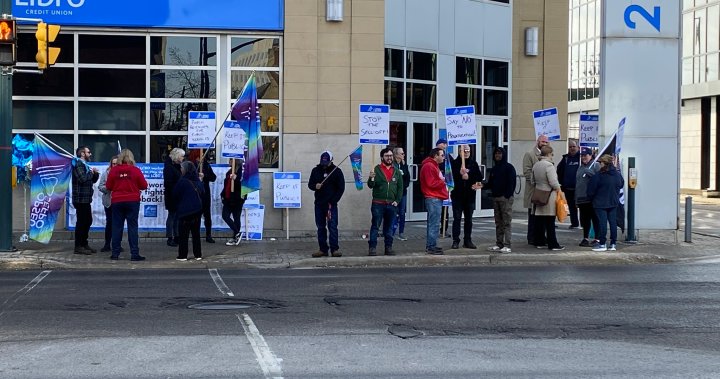Liquor Control Board of Ontario employees represented by OPSEU are rallying in 11 Ontario cities on Tuesday in what they are describing as a push to “fight for good jobs and keep $2.5 billion LCBO revenues invested in public services, not big box store CEO pockets.”
The Day of Action — held in Toronto, Brockville, Hamilton, London, Mississauga, North Bay, Ottawa, Pickering, Port Hope, Thunder Bay and Windsor — comes one day before contract bargaining begins.
The Ontario Public Service Employees Union said it is fighting to reverse pay cuts, keep alcohol sales in public hands and to invest in full-time, good paying jobs at the LCBO.
LCBO employees represented by the union were among the public workers impacted by Bill 124, the controversial wage-restraint legislation that was officially repealed last month. In late 2022, the law was struck down as unconstitutional. The Doug Ford government appealed the 2022 ruling to the Ontario Court of Appeal, which also sided against it. At that point, the government said it would not fight the decision any further.
The legislation has resulted in billions of dollars in backpay being awarded so far, with LCBO members the latest to reach an agreement.
Breaking news from Canada and around the world
sent to your email, as it happens.
Breaking news from Canada and around the world
sent to your email, as it happens.
Over the weekend, the union and province agreed to arbitration, and OPSEU said the arbitrator awarded its members a 6.5 per cent retroactive wage increase spread over the three-year agreement, covering the period from April 1, 2021, to today.
With the issue of Bill 124 seemingly settled, unionized LCBO employees are now setting their sights on fighting against changes to alcohol sales in the province.
In December, the Ford government announced that sales of beer, wine, cider and ready-to-drink, low-alcohol cocktails will be allowed in participating convenience stores, as well as grocery and big box stores, beginning no later than Jan. 1, 2026.
OPSEU notes that profits from LCBO stores go towards public services and that polling suggests Ontarians are more likely to trust the LCBO than private stores to keep alcohol out of the hands of kids. They also argue that as alcohol becomes more accessible, for example through expanded sales in grocery stores, there is a corresponding increase in alcohol-related emergency room visits.
“We’re proud that LCBO revenues contribute $2.5 billion every year into the public services we all rely on, like health care and education,” Colleen MacLeod, chair of the LCBO employees bargaining team, said in a statement.
“We’re not going to stand by while Doug Ford puts that money into the pockets of big box grocery store CEOs. We’re going to fight him every step of the way.”
For its part, the government vehemently denies accusations it is selling-off the LCBO.
In an email Tuesday, a spokesperson for the Ministry of Finance said that the government “will not be privatizing the LCBO.”
“The LCBO will continue to be a publicly owned retailer providing choice and convenience for consumers, as well as operating as the exclusive wholesaler for all retail, bars and restaurants selling alcohol,” the spokesperson wrote
With files from Isaac Callan and Colin D’Mello.
© 2024 Global News, a division of Corus Entertainment Inc.


